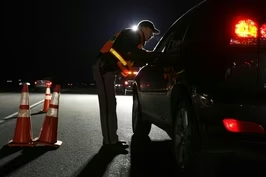
Trump returns to the world stage at Notre Dame’s reopening
Clip: 12/7/2024 | 7m 50sVideo has Closed Captions
Notre Dame’s ceremonial reopening also marks Trump’s return to the world stage
Against the Paris skyline, the Notre Dame Cathedral has risen from the ashes with its official reopening Saturday. Dozens of world leaders, diplomats and celebrities attended the celebration of the monument’s rebirth, including a high-profile return to the global spotlight for President-elect Trump. John Yang speaks with Heather Conley, senior advisor to the German Marshall Fund, for more.
Problems playing video? | Closed Captioning Feedback
Problems playing video? | Closed Captioning Feedback
Major corporate funding for the PBS News Hour is provided by BDO, BNSF, Consumer Cellular, American Cruise Lines, and Raymond James. Funding for the PBS NewsHour Weekend is provided by...

Trump returns to the world stage at Notre Dame’s reopening
Clip: 12/7/2024 | 7m 50sVideo has Closed Captions
Against the Paris skyline, the Notre Dame Cathedral has risen from the ashes with its official reopening Saturday. Dozens of world leaders, diplomats and celebrities attended the celebration of the monument’s rebirth, including a high-profile return to the global spotlight for President-elect Trump. John Yang speaks with Heather Conley, senior advisor to the German Marshall Fund, for more.
Problems playing video? | Closed Captioning Feedback
How to Watch PBS News Hour
PBS News Hour is available to stream on pbs.org and the free PBS App, available on iPhone, Apple TV, Android TV, Android smartphones, Amazon Fire TV, Amazon Fire Tablet, Roku, Samsung Smart TV, and Vizio.
Providing Support for PBS.org
Learn Moreabout PBS online sponsorshipJOHN YANG: Good evening.
I'm John Yang.
The embers of Notre Dame Cathedral were still smoldering in April 2019 when French President Emmanuel Macron vowed to rebuild the centuries old Gothic monument to be more beautiful than before and to do it in five years.
That struck some as wildly unrealistic.
But today, five and a half years and $900 million later, Macron's promise has been fulfilled.
JOHN YANG (voice-over): Against the skyline of Paris, the Notre Dame Cathedral has risen from the ashes, its official reopening marked by Paris Archbishop Laurent Ulrich knocking on the once shuttered doors.
Inside, led by French President Emmanuel Macron, dignitaries and clergy rose to applaud the hundreds of Paris firefighters who fought for hours to douse the flames.
EMMANUEL MACRON, French President (through translator): I am here before you, before we begin the mass, to tell you of the gratitude of the French nation, gratitude for all those who saved, helped and rebuilt Our Lady of Paris, Notre Dame de Paris.
JOHN YANG (voice-over): For nearly 900 years, it had survived the French Revolution, the Franco Prussian War and World War II, only to be devastated in April 2019 by a massive fire.
The roof went up in flames and the spire toppled, nearly destroying the main bell towers.
Outside the incinerated landmarks, stunned onlookers sang hymns.
Reconstruction began almost immediately.
2,000 craftspeople from around the world worked on the project, battling COVID-19 restrictions and toxic lead dust left by the fire.
Dozens of world leaders, diplomats and celebrities attended the celebration of the monument's rebirth.
President Biden didn't attend, citing an unspecified scheduling conflict, and sent First Lady Jill Biden in his place.
Macron personally invited President-Elect Trump, who made his first overseas trip since the election.
For Mr. Trump, it was a high profile return to the global spotlight and an opportunity for face to face meetings with Macron and Ukrainian President Volodymyr Zelenskyy.
JOHN YANG: So today was more than just a celebration of the cathedral's restoration.
It was also President-elect Trump's return to the world stage.
Heather Conley is a senior advisor to the German Marshall Fund.
She was deputy secretary of state for European Affairs in the George W. Bush administration.
So, Heather, we had the very unusual sight today in Paris.
The current president of the United States was not there.
The president elect was there, and he met with the French president and the president of Ukraine.
What do you make of that?
HEATHER CONLEY, German Marshall Fund: Yes, John.
I mean, it's really extraordinary to have a President-elect really beginning to take the, you know, the approaches of state conducting foreign policy while we already have a different administration in place.
So these are extraordinary times.
And certainly President Elect Trump is taking advantage of this moment and the world's focus on the reopening and restoration of Notre Dame to begin that important diplomacy.
JOHN YANG: Now, we're told that French President Macron really lobbied the president-elect to go, that he called him personally.
Why was it so important to Macron that Mr. Trump show up?
HEATHER CONLEY: Well, President Macron -- from President Trump's first administration knows that President Trump likes pomp, circumstance.
He gave it to him in volumes in the first term with the Bastille Day, special ceremonies, restaurant tours.
So he knew this was an opportunity.
President Macron also wanted to be the first European to engage with President-Elect Trump, to shape his views, particularly on the war in Ukraine, also as events are rapidly unfolding in the Middle East.
So this was a real coup for President Macron to have one on one time with the president-elect and then to bring President Trump and Ukrainian President Zelenskyy together in a conversation.
This was really important.
So it paid off, and it's great because President Macron has really had a tough week domestic, and he pulled a great coup off today.
JOHN YANG: Talk about the president's first term.
Of course, we know that his affinity for Russian President Putin, his antipathy toward NATO, and he's threatening tariffs on EU products.
How is Europe approaching this or how are they viewing this second Trump administration?
HEATHER CONLEY: Well, the good news is the European leaders are not surprised.
They were really scrambling in 2017.
They didn't have the connections into the Trump administration or his closest advisors.
They have been working this for several months, meeting with advisors, making those connections.
And it is very, very important when our European allies rely on America's security.
Europe is America's largest trade and investment partner.
It is really important to shape those policies.
So they've really begun to take that approach.
They have scenarios for everything.
They have scenarios to try to not have those tariffs be imposed by an incoming Trump administration offering some carrots, some incentives.
But our European allies are also quite prepared if we go down a tariff road, to remind us that painful tariffs can go both ways.
And it will certainly impact the American economy.
JOHN YANG: Are there signs that the European leaders have learned lessons or learned how to deal with Mr. Trump from the first administration?
HEATHER CONLEY: Yes, they certainly have.
They understand personal relationships are incredibly important.
They know to make sure that they.
They are constantly reaching out to Mr. Trump, to his closest advisors to help shape policies.
And they know Mr. Trump is disruptive, he may say, and shape a policy one day, he may contradict himself in a 24 hour period.
And so they are constantly trying to shape a more positive policy outcome.
And they're reminding Mr. Trump that, you know, should Ukraine fail, should NATO fail, that is actually a massive failure for him, for his administration.
So he wants to project peace through strength.
Strength is our closest relationship with our NATO allies.
JOHN YANG: The political landscape as you referred to earlier in Europe is very different than in the first Trump administration.
Germany's Angela Merkel is gone.
Moderate leaders being pressed by populists on the right.
How is that going to affect European relations with the next Trump administration?
HEATHER CONLEY: Yes, I mean, we know the President-elect likes to have those one on one relationships.
And we know he, in addition to seeing President Macron with the Notre Dame ceremony, he's also seen the Italian prime minister, Prime Minister Meloni.
This is a different political landscape in Europe.
You do have more right center right leaders and certainly you have very close allies in Europe, like Hungarian Prime Minister Viktor Orban.
So he has a political landscape which may be more suited to those issues.
But those same allies want a strong America engaged in security and growing trade and investment.
They don't want to see an isolationist America.
They certainly don't want to see the United States imposing tariffs and harming both of our economies on both sides of the Atlantic.
JOHN YANG: Heather Conley, thank you very much.
HEATHER CONLEY: Thank you.
Christmas tree farm overcomes Hurricane Helene’s destruction
Video has Closed Captions
Clip: 12/7/2024 | 4m 48s | How a Christmas tree farm in North Carolina overcame Hurricane Helene’s destruction (4m 48s)
Would a lower legal limit for drunk driving improve safety?
Video has Closed Captions
Clip: 12/7/2024 | 5m 38s | Drunk driving in the U.S. rose in recent years. Would a lower legal limit improve safety? (5m 38s)
Providing Support for PBS.org
Learn Moreabout PBS online sponsorship
- News and Public Affairs

FRONTLINE is investigative journalism that questions, explains and changes our world.

- News and Public Affairs

Amanpour and Company features conversations with leaders and decision makers.












Support for PBS provided by:
Major corporate funding for the PBS News Hour is provided by BDO, BNSF, Consumer Cellular, American Cruise Lines, and Raymond James. Funding for the PBS NewsHour Weekend is provided by...

